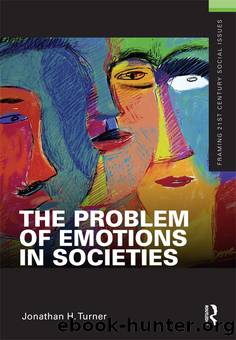The Problem of Emotions in Societies by Jonathan Turner

Author:Jonathan Turner [Turner, Jonathan]
Language: eng
Format: epub
ISBN: 9781138143784
Barnesnoble:
Publisher: Taylor & Francis
Published: 2016-03-30T00:00:00+00:00
Encounters and the Arousal of Emotions
A focused encounter is an episode of face-to-face interaction among individuals where they focus on each other and a topic; out of such interactions come a rhythmic synchronization of talk and bodies, a âwe feeling,â and emotional arousal (Collins 1975, 2004; Goffman 1959, 1961, 1967, 1981, 1983). When people fail to meet expectations, or when they receive negative sanctions, negative emotions are aroused; and these emotions are almost always aroused in micro-level face-to-face encounters. All of the negative emotions that are subject to the dynamics of repression, intensification, and transmutation come from encounters generally lodged inside of corporate units and categoric units. At locations in the divisions of labor of corporate units, individuals interact and experience emotions, depending upon whether they have met expectations and received positive sanctions or the converse. The expectations come from peopleâs identities and from the ideologies of the domain in which a corporate unit is embedded, and these expectations also become part of the normative system of a corporate unit. Similarly, all interactions are embedded in categoric units that are often lodged in the macro-level stratifications system. Social class is itself a categoric unit but if memberships in other categoric units, such as ethnicity, religious affiliation, gender, age, and other distinctions that are salient in a society, correlate with class membership, then this compounding of categoric units creates more potential for emotional arousal, and especially so when people interact.
At first it may seem difficult to see an interaction as embedded in a social category, but a momentâs reflection can reveal that such is the case. For example, an interaction among a number of males and females is embedded in these two gender-based categoric units because what transpires in this encounter is influenced by status beliefs about males and females. Status beliefs are ideas that people hold about the characteristics of individuals in categoric units (Berger 1988; Ridgeway 1982, 1998; Ridgeway and Correll 2004; Ridgeway and Erickson 2000; Ridgeway and Johnson 1990; Ridgeway and Walker 1995; Ridgeway et al. 1998); these beliefs carry evaluations of the moral worth of members in categories and expectations for how they will, and should, behave. Thus, males and females in societies are often differentially evaluated, with clear expectations for how they should behave and interact in encounters. The expectations inherent in status beliefs are generally derived from the tenets of the meta-ideology legitimating the stratification system as a whole. To take another example, an encounter among members of different ethnic subpopulations (each constituting an ethnicity-based categoric unit) will be conducted by the expectations and relative evaluations of each distinct ethnic participant to the encounterâat least initially. If members of more valued categoric units look down upon members of more stigmatized categoric units, then this interaction will reinforce the general structure of the stratification system and the meta-ideology legitimating its form and operation. As this interaction unfolds, emotions are aroused, especially if members of devalued ethnic categoric units are treated as inferiors. Even when individuals are
Download
This site does not store any files on its server. We only index and link to content provided by other sites. Please contact the content providers to delete copyright contents if any and email us, we'll remove relevant links or contents immediately.
Chaco's Northern Prodigies : Salmon, Aztec, and the Ascendancy of the Middle San Juan Region after AD 1100 by Paul F. Reed(368)
Digital International Relations by Unknown(366)
Law Enforcement Interpersonal Communication and Conflict Management by Brian Douglas Fitch(359)
The Enduring Color Line in U.S. Athletics by Krystal Beamon Chris M. Messer(342)
Skilled interpersonal communication: Research, theory and practice, Fifth edition by Owen Hargie(341)
Critical Perspectives on Human Security : Rethinking Emancipation and Power in International Relations by David Chandler; Nik Hynek(336)
EPSO CAST Political affairs EU policies: How to succeed in the selection procedure by Franco Reverte José María(313)
Evidence-Based Policy Making in Labor Economics by Hamermesh Daniel S.;Nottmeyer Olga K.;Nottmeyer Olga;King Sarah;King Sarah;King Sarah;(309)
Writing Public Policy - A Practical Guide to Communicating in the Policy Making Process by Catherine F. Smith(292)
Criminological Theory in Context by John Martyn Chamberlain(286)
Tibeton Yoga Its Secret Doc by Evans-Wentz(281)
Rothschild and Early Jewish Colonization in Palestine (Geographical Perspectives on the Human Past) by Ran Aaronsohn(280)
Positive Psychology and Spirituality in Counselling and Psychotherapy (Conflict, Ethics, and Spirituality, 12) by unknow(277)
Threshold Concepts in Women's and Gender Studies by Christie Launius Holly Hassel(273)
Social Problems, Social Issues, Social Science by James Wright(272)
Play in child development and psychotherapy: toward empirically supported practice by Sandra W. Russ(270)
Cognitive Development in Infancy and Childhood (Elements in Child Development) by Mary Gauvain(269)
Latin American Politics and Society by Gerardo L. Munck & Juan Pablo Luna(238)
What Makes a Social Crisis?: The Societalization of Social Problems by Jeffrey C. Alexander(227)
